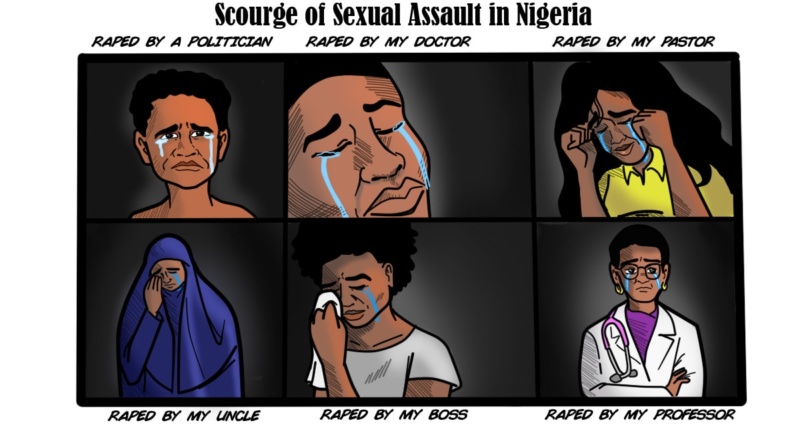By The Editorial Board
Rape is the horrifying secret lurking inside the majority of Nigerian homes and offices. It is a rare Nigerian family that doesn’t hold a sexual assault secret.
The majority of sexual assault secrets die with the victims, undisclosed. Nigerian women often bear their unspeakable secret alone, fearing stigmatization and revictimization.
Sexual assault is a serious public health problem in the nation. Victims suffer immense physical pain and psychological trauma, and many never recover. Some die from their sexual assault injuries. Others conceive a child out of rape — the prevalence of which is difficult to ascertain.
Nationwide, the consequences of this secret can be devastating. It is highly likely that many children in Nigeria are raised by a man who does not realize he is not the child’s biological father. Even when there is doubt about parentage, families keep their doubts internalized.
Here’s another bad news for Nigerian men, especially those who perpetrate sexual violence. With 72% of Nigerian women sexually assaulted and 33% raped during their lifetime, it is highly likely that someone close to you — your mother, sister, wife, daughter and auntie or cousin have been or will be sexually assaulted during her lifetime. Just think about the implication for your family, and your behavior.
In our study and other relevant research, the traits of asserting dominance and power over women, and the normalization of violent and aggressive behaviors against women are often apparent in many cases of sexual violence in the country.
Studies indicate Nigeria is a male supremacist playground where misogyny, sexism and sexual violence find acceptance, and the behavior culturally normalized and often fueled by toxic masculinity.
It is imperative that all Nigerians work together to end this epidemic of sexual assault. It is not the burden women carry alone. The starting point is the toxic masculinity of Nigerian men and the patriarchy culture that perpetuates it.
In this article, we present evidence of the prevalence of sexual assault in Nigeria. We humanize the statistics with examples of lived experiences of victims. Finally, we share latest strategies and individual actions Nigerians can take immediately to foster a culture of healthy masculinity and respect for women — the foundations for stopping sexual assault.
For this article, sexual assault or sexual violence is any type of sexual activity or contact that a woman does not consent to. In this context, sexual assault includes rape, sexual abuse, sexual harassment and sexual coercion.
We disagree vehemently with both the Penal Code applicable in all the Northern States and the Criminal Laws of Lagos which explicitly state that sexual intercourse by a man with his wife, without her consent, cannot be unlawful, and therefore a man cannot rape his wife. This is despicable.
Toxic masculinity represents the socially regressive and culturally embedded male traits that foster domination, devaluation of women, and wanton sexual violence against women.
The Prevalence of Sexual Violence in Nigeria
Cases of sexual assault are increasingly reported in Nigeria. In our research and comprehensive analysis of sexual assault studies in Nigeria1, we found that:
- 72% of Nigerian women experienced some form of sexual assault during their lifetime. This is a combined measure that includes rape, sexual abuse, sexual harassment and sexual coercion.
- 33% of sexually assaulted women were raped.
- 62% of victims knew their assailant(s).
- 80% of victims did not inform family members, including their spouses about the assault.
- 19% of pregnant women experienced sexual abuse by their male gynecologists during pregnancy examination, including unnecessary touching and invasive digital penetration.
- 52% of students have been subjected to sexual harassment in exchange for grades or academic advise by teachers and professors.
- 18% of sexual assaults were perpetrated by religious leaders.
- 1 in 3 sexual assault victims experienced it at an early age before 16th birthday, some before 5 years.
- 28% of sexual assaults perpetrators were neighbors.
- 40% of sexual assaults occurred in the assailants’ house.
- 1 in 5 housemaids experienced sexual assault. The perpetrators were either the masters or their son(s) or both. There’s an example where the wife forced abortion on a maid to protect her husband.
- 45% of victims who were examined in hospitals presented vaginal and anal lacerations and perforations.
- Some victims were exposed to sexually-transmitted diseases and the risk of unwanted pregnancy.
As the above statistics indicate, despite progress toward gender equality around the globe, Nigeria stands out as a society that systematically dishonors and devalues women. We make clear that not all Nigerian men are predators.
Sadly, yet unsurprisingly, there is no safe space for women in Nigeria. Not in the places of worship. Not in workplaces. Not in secondary schools and universities. Not in the doctor’s office. Not on the streets. Not even in their own homes.
We note that sexual assault statistics on Nigeria published by the National Bureau of Statistics (NBS) and other international agencies are woefully inaccurate because survey alone is an inadequate instrument for eliciting detailed lived experiences of victims.
In addition, women don’t report sexual assaults because of the burden of proof required for conviction as well as the social stigma it brings. When they report, they are often not believed. The police ridicule them, their husbands blame them, and often they are ostracized by communities. Silence is the only option.
We urge readers to exercise caution when comparing sexual assault statistics to previous reports elsewhere because there are differences in data collection and analysis methods and the language and terminology used, and the context in which questions are presented to respondents.
Lived Experiences of Sexual Assault Victims
We invested months investigating sexual assault in Nigeria, reviewing relevant medical studies on the subject and conducting interviews with victims whose names we concealed to protect their identities.
We reveal secrets that have never been told before from victims who have found the burden of silence too hard to bear. We edited the stories for length and clarity.
Ademola was assaulted by her gynecologist.
My gynecologist sexually assaulted me when I was 6 months pregnant. I trusted him as my doctor. He sexually attacked me when I was at my most vulnerable. We had recently moved to Lagos. The gynecologist was highly recommended by a church friend. So, I trusted him. Before my second checkup visit, his assistant called to let me know that my scheduled time was changed and I should delay arrive until later that evening. When I arrived, I was one of a few people left in the clinic. He requested I fully undress for a complete examination. I found his request unusual but since this was my first pregnancy, I had no basis to question him. I found myself naked with him alone in the examination room. He started fondling my breasts. I protested and he told me he was doing his job to ensure there wasn’t a lump somewhere. Suddenly he turned into a beast and sexually assaulted me. That was the last I saw him.
Ekaete was 22 years of age when she was sexually assaulted by her professor.
My public health professor sexually assaulted me in his office when I was in medical school. I was struggling and vulnerable. He used his power and authority position to exploit my feelings of desperation. He took advantage of me and raped me even when I resisted and asked him to stop. He continued. I cry every time I recall the terrible experience, especially now that I’m married.
Nnenna was 25 years old when she was raped by her boss.
My boss forced me to have sexual intercourse with him. He started by telling me how well I dressed. He moved to touching my breasts inside his office. I asked him to stop and told him he was making me uncomfortable. The next day he called me into his office again and threatened me. He said, “you know I can fire you and give the job to someone else who is willing to do what I want?” I told him I didn’t want to lose my job; I just started this job three months ago. He went to a meeting in a hotel in town and he called me to bring some documents to the conference location. When I arrived, he demanded I come up to his room. It was there that he assaulted me. I resisted and he subdued me physically and raped me. What he did wasn’t right, but I didn’t know what to do. I needed to keep the job. But the trauma and shame stays.
Aisha was raped by his uncle when she was 13.
When I was 13 years old I was sexually assaulted by my uncle in his house in Kaduna. I never told anyone that I was raped as a teenager. After the rape I saw blood running down my leg, and I cleaned up before heading home. I remember my uncle intimidated me and warned me not to tell my parents or anyone. My parents are Muslims and I feared they would blame me for what happened. I blamed myself rather than my uncle who raped me. But the trauma of the rape has stayed with me all these years.
Funmilayo was raped by her husband.
I was already asleep when my husband returned late at night apparently drunk. He jumped on me. I woke and saw him pulling off my underwear. I told him to stop. I emphasized I was not in the mood for sex. He knew I was pregnant, fatigued and always in pain from a back injury. He ignored my plea and physically assaulted me. He raped me twice that night. I sobbed all night with excruciating virginal pain. When I confronted him in the morning, he told me, “I’m your husband and I can have you when I want.” That was how he saw it. My pain didn’t matter to him.
Adaugo was repeatedly raped by husband.
I was violently and repeatedly raped by my husband who was then a university professor. He would insist that he paid my bride price and owned me…I was obligated to serve his sexual desires anytime he wanted. In each assault, I never consented. I was his sex slave and he exploited me for his pleasures. But when we left Nigeria to America, I found my voice and filed a sexual abuse complaint with evidence. I divorced him and went on with my life. I earned a PhD, has a good job and raised our children all alone. Still, the repressed trauma of many years of sexual abuse in Nigeria can’t be erased from my memory.
Bisola was sexually assaulted by a pastor.
I was only 18 when I was raped by the pastor. He was a good friend of our family and often came to our home to settle disputes between my parents. I saw him as a peacemaker and held him in high esteem. Since we lived near the church, I would go there to alert him when there was trouble at home. I didn’t have a phone then. On that fateful day, I went into his church office that evening to tell him that my parents were fighting. He held me and initially seemed to be comforting me. Suddenly, he started touching me and I froze. He carried me to the sofa and raped me. It was so painful and I begged him several times to stop. He ignored my plea until he was satisfied. I went home and hid in my room and never told anyone. I guessed my parents would never believe me because they respected the pastor.
While these harrowing stories are mind numbing, there are just the tip of the iceberg. Given that sexual violence against women is by all accounts under-reported, there are hundreds of thousands of untold stories like these.
What To Do To Reduce Sexual Assault
Fixing institutionalized sexual violence shouldn’t rest only on women’s shoulders. It’s a national responsibility. Here are steps Nigeria and Nigerians can take to protect women from sexual assault perpetrators.
- Listen to victims and make it okay for them to speak their truths. We must empower women to speak up and share their experiences without being shamed or judged.
- Teach your children early on that no one, including relatives and friends, should touch them inappropriately. Create enabling family environment where your children feel comfortable to share sexual abuse experiences with you without feeling ashamed or judged.
- Know what your children do online. The internet can be an indoctrination into pornography which often objectifies women as sex subjects. It can also become a recruiting ground for predators. Online dating site is a zoo full of dangerous predators.
- Educate young people about rape and how to report it. Sexual assault awareness must be integrated into the curriculum beginning as early as is necessary in all tiers of education in the nation. Young boys must be made aware of what it means when a girl says NO or STOP. They must understand the consequences of sexual assault and that it’s never Ok.
- Men must lead by good example. Men must work harder to create a culture that rejects demeaning and devaluing women, including those in their households. They should speak up against messages that tolerate sexual violence against or mistreatment of women. They must role-model the behavior they want their young boys to follow.
- Political leaders must lead by good example. Leaders must be particularly clear that they are committed to upholding a zero-tolerance behavior on sexual assault. Political leaders have failed women.
- Condemn and redefine toxic masculinity. Masculinity is not the problem; there are healthy aspects of it. What must be condemned by all Nigerian parents, especially men, is the type that emphasizes male superiority and dominance and control of women. Men must redefine masculinity as caring, compassionate and respectful of all genders, especially women. Imprinting healthy masculinity on young men is one of the most fundamental, yet overlooked solution.
- Outlaw dowry payment for marriage. In and by marriage, men claim women as object they bought in the cultural market. Accordingly, a woman automatically consents to sex when and where the husband demands it. This notion of consent-by-marriage is empowering men to sexually assault their wives at will. The ancient dowry custom has outlived any usefulness, if it actually had any.
- Strengthen the Federal Ministry of Women Affairs. The role of this ministry is ill-defined. The ministry is poorly run and ineffective. What is urgently needed is well-articulated policies and public awareness campaigns to address the devaluation of women and the toxic masculinity of men. Establish policies of zero tolerance for sexual harassment and violence in all spaces.
- Educate the police. One of the major complaints by victims is that the Nigerian police does not take rape cases seriously and often demand money or sexual favors from victims – revictimizing them. Even when rape cases are processed, the evidence collection is inadequate and often compromised. The government must invest in police training on how to handle rape victims and the evidence they present.
- Reduce the threshold required for conviction. Today, it is very hard to make a case against sexual assault criminals. The burden of evidence is too high to achieve conviction.
- Establish a special prosecution office for sexual assault cases. Create an independent special victim’s prosecution office around the nation, empowered to make decisions on filing charges and sending sexual assault cases to trial without the typical delays that plague cases today. What is urgently needed are speedy trials and aggressive prosecutions. Lagos State is on the right path on this matter.
- Toughen laws. Nigeria’s Senate passed a bill aimed at combating sexual harassment as part of a broader move to uphold ethics in the nation’s universities. The law is riddled with loopholes and in fact ineffective.
- One set of National laws on sexual violence. There are many disjointed statues across the nation that complicate prosecution. Unify these laws and make it easy to prosecute offenders everywhere in the nation.
- Citizens join NGOs or become an activist. Don’t just sit there, do something. There are many anti-sexual assault NGOs in Nigeria looking for volunteers. Join one and let your voice be heard. Collective action is a powerful tool to fight the scourge of sexual violence.
- Collect accurate and detailed rape statistics. The National Bureau of Statistics (NBS) sexual violence statistics is awfully inaccurate, inadequate and unreliable. Nigeria needs a robust sexual assault data repository. Accurate baseline data is useful for policymaking and program monitoring.
In sum, we all have a responsibility to stop sexual assault in the nation. When President Buhari objectified his wife as belonging in his bedroom, at his command and for his personal desires, he spoke for all misogynists in Nigeria, including his fellow misogynists in the National Assembly. The change must also start from the top. But we all must become the change we want.
1List of citations available. Please tap the CONTACT tab to request citations.




